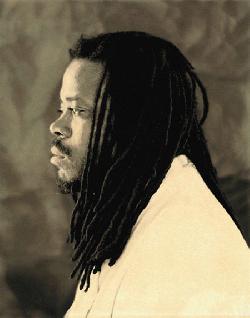The other great piece on Michael was Greg Tate's tour de force in The Village Voice on Michael's legacy. Tate, as you may know, is an author of three books, numerous essays, a founding member of the Black Rock Coalition, and now bandleader and music director of Burnt Sugar, a band that fuses rock, jazz, funk and African music using Butch Morris' Conduction system.
But today, I'm here to highlight Greg's writing. As ever, he's great about setting some context:
What Black American culture—musical and otherwise—lacks for now isn't
talent or ambition, but the unmistakable presence of some kind of
spiritual genius: the sense that something other than or even more than
human is speaking through whatever fragile mortal vessel is burdened
with repping for the divine, the magical, the supernatural, the
ancestral. You can still feel it when you go hear Sonny Rollins, Ornette Coleman, Aretha Franklin, or Cecil Taylor, or when you read Toni Morrison—living Orishas
who carry on a tradition whose true genius lies in making forms and
notions as abstract, complex, and philosophical as soul, jazz, or the
blues so deeply and universally felt. But such transcendence is rare
now, given how desperate, soul-crushing, and immobilizing modern
American life has become for the poorest strata of our folk, and how
dissolute, dispersed, and distanced from that resource-poor, but
culturally rich, heavyweight strata the rest of us are becoming. And,
like Morrison cautioned a few years ago, where the culture is going
now, not even the music may be enough to save us.
talent or ambition, but the unmistakable presence of some kind of
spiritual genius: the sense that something other than or even more than
human is speaking through whatever fragile mortal vessel is burdened
with repping for the divine, the magical, the supernatural, the
ancestral. You can still feel it when you go hear Sonny Rollins, Ornette Coleman, Aretha Franklin, or Cecil Taylor, or when you read Toni Morrison—living Orishas
who carry on a tradition whose true genius lies in making forms and
notions as abstract, complex, and philosophical as soul, jazz, or the
blues so deeply and universally felt. But such transcendence is rare
now, given how desperate, soul-crushing, and immobilizing modern
American life has become for the poorest strata of our folk, and how
dissolute, dispersed, and distanced from that resource-poor, but
culturally rich, heavyweight strata the rest of us are becoming. And,
like Morrison cautioned a few years ago, where the culture is going
now, not even the music may be enough to save us.
And here he is on Michael's visual legacy:
And until Hype Williams
came on the music-video scene in the mid '90s, no one else insisted
that the visuals supporting r&b and hip-hop be as memorable,
eye-popping, and seductive as the music itself. Nor did anyone else
spare no expense to ensure that they were. But Michael's phantasmal,
shape-shifting videos, upon reflection, were also, strangely enough,
his way of socially and politically engaging the worlds of other real
Blackfolk from places like South Central L.A., Bahia, East Africa, the prison system, Ancient Egypt.
He did this sometimes in pursuit of mere spectacle ("Black and White"),
sometimes as critical observer ("The Way You Make Me Feel"), sometimes
as a cultural nationalist romantic ("Remember the Time"), even
occasionally as a harsh American political commentator ("They Don't
Care About Us"). Looking at those clips again, as millions of us have
done over this past weekend, is to realize how prophetic Michael was in
dropping mad cash to leave behind a visual record of his work that was
as state-of-the-art as his musical legacy. As if he knew that one day
our musical history would be more valued for what can be seen as for
what can be heard.
came on the music-video scene in the mid '90s, no one else insisted
that the visuals supporting r&b and hip-hop be as memorable,
eye-popping, and seductive as the music itself. Nor did anyone else
spare no expense to ensure that they were. But Michael's phantasmal,
shape-shifting videos, upon reflection, were also, strangely enough,
his way of socially and politically engaging the worlds of other real
Blackfolk from places like South Central L.A., Bahia, East Africa, the prison system, Ancient Egypt.
He did this sometimes in pursuit of mere spectacle ("Black and White"),
sometimes as critical observer ("The Way You Make Me Feel"), sometimes
as a cultural nationalist romantic ("Remember the Time"), even
occasionally as a harsh American political commentator ("They Don't
Care About Us"). Looking at those clips again, as millions of us have
done over this past weekend, is to realize how prophetic Michael was in
dropping mad cash to leave behind a visual record of his work that was
as state-of-the-art as his musical legacy. As if he knew that one day
our musical history would be more valued for what can be seen as for
what can be heard.
And finally on his demise:
The unfortunate blessing of his departure is that we can now all go
back to loving him as we first found him, without shame, despair, or
complication.
back to loving him as we first found him, without shame, despair, or
complication.
Read the full article (and it's worth it!) here.

